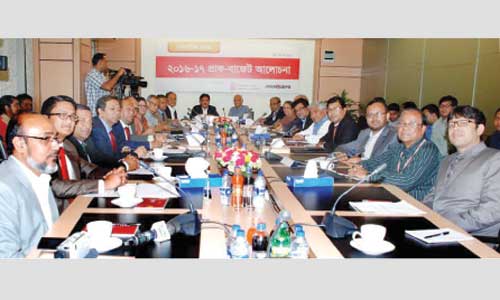Experts suggest keeping two separate VAT rates
Economists and experts on Thursday suggested the government for keeping two separate value-added tax rates for businesses considering the prevailing reality regarding economic situation and accounting practices in the country.
They said that there should be another VAT rate of more or less 10 per cent along with 15 per cent set in the new VAT law which is scheduled to come into force from July 1, 2016.
At a pre-budget discussion held at the daily Prothom Alo conference room in Dhaka, they also demanded for ensuring waste-free expenditure of taxpayers’ money in executing development projects and meeting the government’s other expenditures.
Institute of Chartered Accountants of Bangladesh and the daily Prothom Alo jointly organised the roundtable meeting.
‘Two different VAT rates should be continued for traders based on their book-keeping practices,’ said economist Wahiduddin Mahmud, also chairman of the Economic Research Group.
It will be very dangerous if all on a sudden a single 15 per cent VAT is imposed on all goods and services, he said.
The proposed 15 per cent VAT may continue for businesses which maintain records of sales, purchase and other transactions as they will be able to take rebate on previously paid VAT on input, he said.
But the rate should be lower like the existing practices for those small and medium enterprises and retailers who cannot maintain accounts properly, he suggested.
There should be some kind of disincentives for not maintaining proper transaction records, he said.
There may be two VAT rates—15 and 10 per cent—for essential and luxury consumer goods, he said.
He also advised the government for taking all necessary steps to ensure environment for boosting private investment in the country as the ratio of private investment and GDP has been declining in last few years.
If it cannot be done, the government should increase development expenditure to stimulate private investment, he added.
Wahiduddin also raised questions about how the government selects and prioritizes the large development projects.
‘How the government selects and prioritizes a large project, does it evaluate the economic advantages and disadvantages, environmental impact of the projects,’ he asked.
He said that there were many discussions, mainly on environmental impact, which are being held on Rampal coal-based power project, but did the government assess financial advantages and disadvantages of the project which is being implemented by a Bangladesh-India joint venture.
Former NBR chairman Abdul Mazid suggested for continuing package VAT for small traders along with 15 per cent for large businesses.
The Federation of Bangladesh Chambers of Commerce and Industry former first vice-president Jashim Uddin said that the businesses wanted implementation of the recommendations of the NBR-FBCCI joint committee related to multiple VAT rates in the budget under new VAT and Supplementary Duty Act-2012.
Former adviser to the caretaker government, also Transparency International Bangladesh chairperson, Sultana Kamal raised questions over higher allocation for defense sector saying that country’s health and education sectors needed more funds.
She also demanded for stopping misuse of public funds.
ICAB president Kamrul Abedin suggested the government for restricting employment of foreign nationals
in sensitive positions in terms of country’s business and security.
He also emphasized on developing skilled human resources to end the culture of hiring foreign nationals.
Dhaka Chamber of Commerce and Industry former president Asif Ibrahim, Bangladesh Securities and Exchange Commission chairman Faruk Ahmad Siddiqi, Bangladesh Economic Association secretary general Jamal Uddin Ahmed, Prothom Alo joint editor Abdul Kaiyum, among others, spoke at the discussion.
News Courtesy: www.newagebd.net











